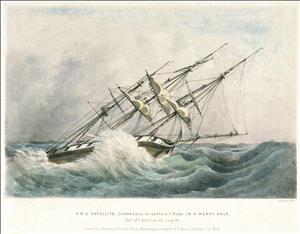In December 1852, Captain Henry Roeder and Captain Russell V. Peabody establish Whatcom Mill on Bellingham Bay. It is one of the first American settlements at what will become the city of Bellingham.
Roeder and Peabody were diligently searching Puget Sound for an ideal site for a sawmill that would enable them to process the vast stands of Northwest timber and sell their lumber to the re-builders of San Francisco, badly devastated by fire. Thanks to the guidance of Chief Cha-wit-zit of the Lummi Tribe, Roeder and Peabody built their mill at a place the Native Americans called "What-coom" meaning "noisy, rumbling water." It was this noisy rumbling water that was essential to turn the mill wheel that, in turn, drove the cutting machinery.
Though originally envisioned as an exporter of lumber to San Francisco, difficulties in starting up the mill caused Roeder and Peabody, together with business partners William Utter and H. C. Page, to miss the height of lumber market prices. By the time the mill was operational, other mills had stepped in to meet the needs of San Francisco, and lumber prices, which had been as high as $1,000 per thousand feet just after the fire, fell back to $20 per thousand feet. Another potential boom for the mill occurred in 1858 when gold was discovered along the Fraser River in British Columbia. This boom was short-lived and did not have a large financial effect on the mill.
From 1853 to 1873 the mill operated sporadically. Much of its lumber went to supply buildings in and around Victoria, British Columbia, including the Royal Navy barracks, the hospital at Esquimalt, and the Church of England in Victoria. In 1873, a fire destroyed the Whatcom mill. By this time Roeder's attention had turned back to his original vocation -- sailing -- and Captain Peabody had died in California (in 1868).
Disputes over Peabody's inheritance caused the mill to lay idle until a group of settlers from Kansas, called the Washington Colony, moved into Bellingham Bay and revived operation of the mill in 1881. In 1883 the Colony mill, as it came to be known, at last fulfilled Roeder's and Peabody's original dream of exporting to the California market by delivering its first large shipment of lumber to San Francisco on the bark Columbia. By 1885, the Colony was mired in lawsuits and debts and the mill was abandoned.

